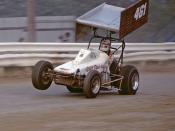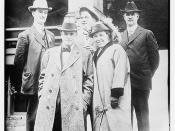Kurt Vonnegut explores aspects and influences of families throughout Slaughterhouse-Five, specifically Billy's childhood, his adult family, and the family of Edger Derby. Families, though not always visibly, are a major influence to each of the different round characters in the story. Vonnegut's views and knowledge of anthropology are expressed through the characters; families and other small social communities are essential to the growth and development of a human being. Billy is unable to produce emotions and have typical social interactions with people because of his rough childhood.
Billy is a lonely, shy person and much of his personality is due to his family relationships as a child. Every one of Billy's childhood experiences described in Slaughterhouse-Five is unpleasant. Billy, as a child, is uncomfortable in situations with his family. The crucifix Billy is given by his mother terrifies him. "Billy wasn't a Catholic, even though he grew up with a ghastly crucifix on the wall...
[His mother] developed a terrific hankering for a crucifix, though. And she bought one from a Santa Fe gift shop during a trip the little family made out West during the Great Depression... And the crucifix went up on the wall of Billy Pilgrim" (Vonnegut p.38-39). When Billy does not know how to swim, his father throws him in the deep end of the pool. "Little Billy was terrified, because his father had said Billy was going to learn to swim by the method of sink-or-swim. His father was going to throw Billy into the deep end, and Billy was going to damn well swim" (Vonnegut p.43). Later, while visiting the Grand Canyon, Billy is afraid of falling in. Instead of feeling comforted by his mother's touch he wets himself. "Billy hated the canyon. He was sure that he was going to fall in.



Well Done
As an extremely happy person, I wanted to thank you for your incredible paper you wrote. You have made an incredible paper. You have help me understand "Slughterhouse-Five." I never thought I would read this paper here. I can say with all confidence that your paper is well, and I would recommend it to every single person in cheathouse.
Well Done!
4 out of 4 people found this comment useful.